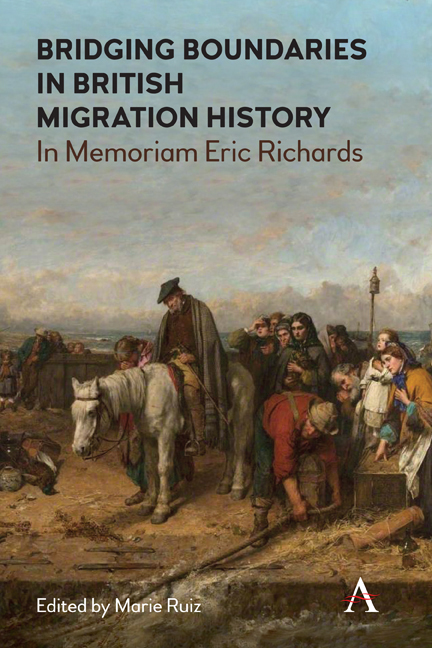Chapter 1 - Eric Richards, Positionality and Migration History
Published online by Cambridge University Press: 20 January 2022
Summary
Humanity seems always to have been a mobile species, from its earliest African origins through to its long-term stretchings to the end of the earth. And now we seem more mobile than ever, forever dislocating and relocating within and between countries. Mobility seems like a defining trait of the species, a constant and perpetual shifting of people through each succeeding generation – behaviour so general that it may need no history, an endless predictable seamless spreading of people in all directions. Mobility seems like a non-variable in human affairs, twirling apparently without restraint.
Eric RichardsIntroduction
When I invited Eric Richards to speak in Amiens, France, in September 2018, little did I know that one year later I would be writing an introduction to a memorial volume in his honour.
Few historians have been as influential as Eric in British migration history. Between the onset of his career in 1970 and 2018, he published over 140 articles and book chapters, edited at least 10 volumes and completed 12 monographs, which is an impressive total. His canonical groundbreaking Britannia's Children (2004) has become a bible for historians of the British Empire.
When we met in Paris in the Fall of 2017, I was co-editing a volume on migration crises to which Eric was contributing with one chapter, titled ‘Migrants in Crisis in Nineteenth-Century Britain’. That day, we walked around the Latin quarter and discussed the book. As a freshly graduated associate professor, I was impressed by this commanding figure of British migration history, yet he quickly made me comfortable and we engaged in a very enjoyable discussion challenging ideas and conceptions of migration. As he was exploring the roots of the Anglosphere, he was very interested in visiting our anglophone studies departments in France and learning about our use of the term ‘anglophone’ – in an academic system that is very different from English-speaking universities.
Although I had never met him before, he had already made a great impression on me not only through his remarkable work but also by generously agreeing to write an endorsement for my first book's cover (as did James Hammerton, who read the whole manuscript before publication and provided precious advice).
- Type
- Chapter
- Information
- Bridging Boundaries in British Migration HistoryIn Memoriam Eric Richards, pp. 3 - 26Publisher: Anthem PressPrint publication year: 2020



